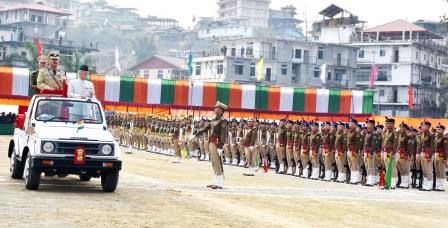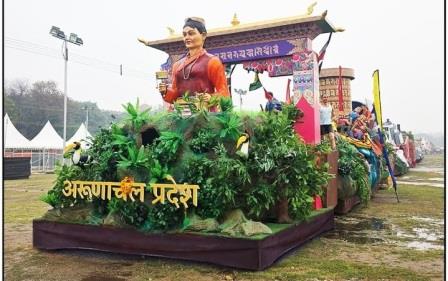-
 Arunachal celebrates 77th Republic Day with fervour
Arunachal celebrates 77th Republic Day with fervour
-
‘Local Food Contest’ marks National Tourism Day
-
AFTF reiterates scrapping of 80:20 recruitment ratio in Arunachal Pradesh
-
Governor, First Lady host ‘At Home’ reception
-
Papum Pare DA holds interaction with newly elected ZPMs
-
Indian Army conducts ‘Know Your Army’ campaign
-
 Arunachal tableau on R-Day spotlights state’s emergence as Adventure Capital…
Arunachal tableau on R-Day spotlights state’s emergence as Adventure Capital…
-
Etalin marks National Voters’ Day, encourages youth participation in democracy
-
Sona reviews PMGSY, VVP projects in Itanagar Circle
-
Lok Bhavan celebrates UP Diwas
Bracing for a 12-hr dawn to dusk bandh on Tuesday, the state is on tenterhooks as once again the vexatious Chakma-Hajong refugees issue is spreading unease among the indigenous population. The Centre's decision to grant these refugees Indian citizenship has put the Frontier state in a complicated situation.
Natural justice demands that these refugees residing in Arunachal and parts of India for well over 50 years be given citizenship rights. Many other refugees have been availing the right since long back after residing for much shorter durations. That said this decision is turning out to be convoluted especially for Arunachal which is a protected area.
Even bona fide Indian citizens need an Inner Line Permit to enter and reside in the state. None apart from the indigenous tribal population have land rights. These checks have since inception protected the uniqueness of this Himalayan state. This is where citizenship to the Chakma-Hajong refugees is a googly.
Giving the refugees Indian citizenship but not Scheduled Tribe (ST) status hardly makes sense and is no safety measure. The fact that these refugees are living and settled on Arunachal soil brings to the fore many unaddressed concerns. As time will pass their numbers will only grow and with this more land will be swallowed up for their rehabilitation.
Though, the Centre’s decision will not give the Chakma-Hajong refugees APST status and land ownership rights, the fear of being outnumbered is not imaginary. Official data reveals that the number of these refugees has increased from about 5,000 in 1964-69 to 1,00,000. The local indigenous communities have already been reduced to minority and many warn that this is only the beginning.
The Centre has attempted a tricky balancing act in Arunachal Pradesh by announcing “limited citizenship” to these refugees. However, this decision will be logical only if all of the refugees already settled here are relocated to other states of the country.
--

Kenter Joya Riba
(Managing Editor)She is a graduate in Science with post graduation in Sociology from University of Pune. She has been in the media industry for nearly a decade. Before turning to print business, she has been associated with radio and television.
Email: kenterjoyaz@easternsentinel.in / editoreasternsentinel@gmail.com
Phone: 0360-2212313

